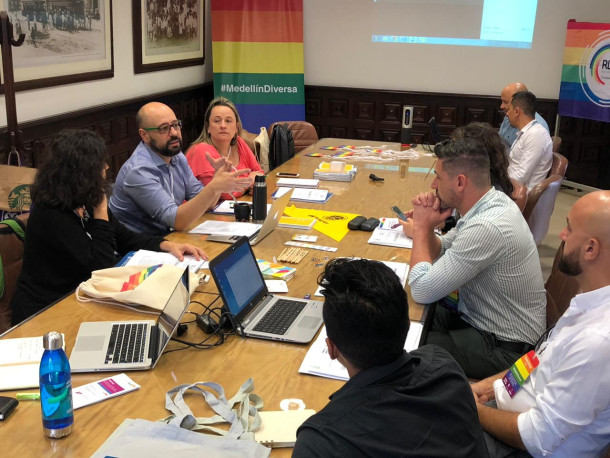
Casa Diversa at Comuna 8, Medellín
During the Colombian Conflict (1964 – 2016), The "Mesa LGBT Comuna 8" collective of Medellín was victim of violence, threats and discrimination due to the sexual orientation and gender identity of its members. As a consequence of those persecutions, the collective scattered.
Later on, within the Victims Reparation Law framework, the resolution number 2016-19777 (of January 15, 2016) recognized the violation of the rights suffered by the collective as subject for collective reparation. The State was to compensate the damages in order to help the collective regain its role as a social agent that fights for the rights of the LGBTI community.
After this recognition, began the work to articulate all the actors involved in the process of building a diagnosis as well as the work plan to reinstate the collective. The Colectivo Mesa Diversa, the municipal and nacional victims units, Centro para la diversidad Sexual e Identidades de Género de Medellín, and Ministerio público de Colombia are working together on this emblematic case.
The whole challenge is about the inclusion of collective subjects as subjects of full right—through restoring the trust in the territory and the State. It is based on three components: organizational strengthening, territorial articulation, memory and collective reparation. Those factors will help Mesa LGBT Comuna 8 regain recognition as a social actor with capacity for public incidence.
The aim is to incorporate in the diagnosis phase a focus which will approach at the same time the diversity and the victims, so as to build a guiding model for the reparation of other LGBTI collectives. Nowadays, there is no protocol, at the national level, for these kinds of interventions: it is the first experience of this kind and it marks a route to be implemented in other groups affected by similar events and which were not recognized yet.
Ever since their return to Comuna 8, Casa Diversa is now the space for this LGTBI group. Jhon Restrepo, the leader of the collective, expressed that the challenge was looking toward the future rather than the past: "We don’t want to go back in the past. We want to move towards the future." The experience of Casa Diversa of Comuna 8 shows the strength of the concept of intersectionality within this territory: it reunites youth from the neighborhood, the afro-descendant population — predominant in the territory—, and the LGBTI social sectors.
Third pilot project meeting
This project was presented at the third meeting of the pilot project Intersectionality in metropolitan LGBTI policies. It was held on October 16 to 19th 2018 in Medellín, and the aim of the project is to incorporate intersectional perspectives in the policies for the LGTBI collective (lesbians, gays, bisexuals, trans and intersex). This project brings together the cities of Montevideo, Medellin, Mexico, Berlin, Barcelona and Buenos Aires. Bogotá (Colombia) and Rosario (Argentina) were invited to this third meeting; both cities are part of the Latin American branch of the Rainbow Cities Network.
The intersectional approach recognizes that people from all backgrounds can be affected by multiple inequalities — and that new types of discrimination can be generated, different from the sums of those inequalities. For example, as shown in the case of Mesa LGBTI Comuna 8: what happens with LGBTI persons who are also victims of the violence of the Colombian conflict? Using the intersectional approach is placing human rights of the underprivileged as cities’ main concern.
The project aim to share its work experiences built with the LGBTI persons considering —gender, age, national origin, among others— and creating a guide for the elaboration of policies with an intersectional approach. This guide will be available for Metropolis members.
To learn more about the LGBTI collective and the Colombian armed conflict violence —including Mesa LGBTI Comuna 8 experience— visit:
Written by Andrés Scagliola.
